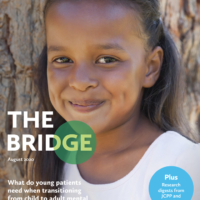Research digest
-

A history of abuse increases the risk of suicide attempts in youth
Researchers in Belgium and the USA have conducted one of the first investigations into whether a history of various forms of abuse and the presence of mood disorders and psychotic symptoms can predict suicide attempts in psychiatrically hospitalized children.
Read more -

August 2020 – The Bridge
This month there has been a renewed focus on the impact of institutional care on children’s development and mental health, following publication of the Lancet Group Commission on this subject.
Read more -

Does DNA methylation link sleep disturbances to mental health problems?
Sleep disturbances have long been linked to mental health problems in children, but the underlying mechanisms of this relationship are unclear.
Read more -

Do we remember more when learning before bedtime?
Researchers at the University of York have found that children with poor reading comprehension have a lower capacity for vocabulary learning than children with good comprehension.
Read more -

Depressed mood, inattention and worry might influence the risk for other symptoms in youth
Youth psychopathology has traditionally been conceptualized and measured at the level of disorders, which are highly heterogeneous and comorbid. However, there is growing evidence that focusing on the causes of individual symptoms might be useful.
Read more -

Is neurocognitive functioning linked to a family history of a suicide attempt?
Jones et al. matched 501 participants (aged 8-21 years) who had a family history of a suicide attempt with ~3,000 participants with no such family history.
Read more -

Are school-based interventions for depression and anxiety symptoms effective?
Gee et al. conducted a systematic search for randomised controlled trials of indicated psychological interventions delivered in an education setting. They focused on trials of interventions for adolescents aged 10-19 with elevated symptoms of depression and/or anxiety.
Read more -

Harnessing the potential of digital technology for remote interventions with young people
Charlotte Sanderson and colleagues explain that there is good empirical evidence supporting that digital interventions can be clinically effective.
Read more -

Implementing mental health support in schools faces many challenges
Researchers identified 50 studies that reported barriers or facilitators to implementing interventions for adolescent emotional disorders delivered in educational settings. They found several important factors, including barriers of practical and logistical problems, and facilitators of quality training and supervision.
Read more -

What do young patients need when transitioning from child to adult mental health services?
Researchers have examined the ethical values that people expect to underpin the transition from child and adolescent mental health services (CAMHS) to adult mental health services (AMHS).
Read more